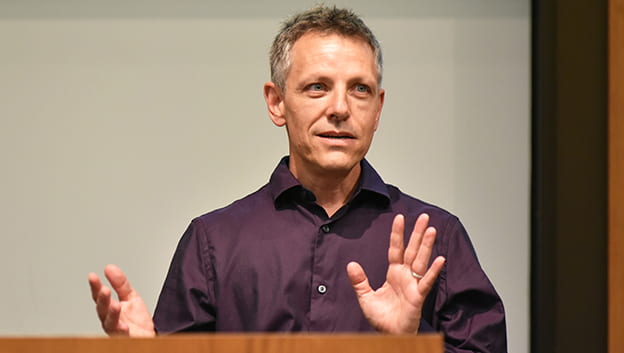Jeffrey Ely’s research is an eclectic mix.
Over the years, Ely, the Charles E. and Emma Morrison Professor of Economics, has applied game theory to a broad array of topics ranging from mechanism design to torture to, more recently, a mathematical formula for suspense encompassing expectations, uncertainty, belief and time.
A year after publishing “Suspense and Surprise” in the Journal of Political Economy alongside University of Chicago economics professors Emir Kamenica and Alexander Frankel, Ely reflects on the groundbreaking effort he calls “the highlight of my career.”
How did you get interested in this topic of suspense?
As a fan of tennis, I watch all of the major tournaments, but often TiVo events to watch them later. Doing this, it occurred to me that we have more freedom in how we expose ourselves to events. Do you fast-forward through a set? Ask a friend if it’s worthwhile to watch the first match? That set me on a path to explore the design of the release of entertainment.
What are the greater implications of this research?
Our work gives people a way to think about entertainment as something you can quantify and whose impact you can measure. Guided by these measurements, we can think about how the design of entertainment can be structured.
How does this play out in the real world?
Take “American Idol” and the way it historically staged its elimination show: one contestant after another was deemed safe until only two remained. At that point, the host said a name. Sometimes that person was the one being eliminated; sometimes, that person was safe. At the time a name was announced, the spotlight focused entirely on that one individual, which generated suspense because there was no repetitive pattern week after week.
What did you most enjoy about this research?
I loved finding a way to take a formal, mathematical model and show how it could be used to describe things in a way that hadn’t been thought of before. It’s opened up a brand-new frontier for mathematical models — and in an area where it was probably least expected.
I was actually invited to an entertainment conference in Berlin attended by screenwriters, producers, actors and others from the industry. I was asked to present on the strategies for maximizing suspense and surprise that we had derived from our theory. While doing that, I could see peoples’ eyes open up as I explained our research. That was absolute magic.
What are the future plans you have for this research?
The next step would be hooking up with neuroscientists to gather physical measurements of people reacting to what they see and then correlating that to the variables in our mathematical model. This would help us discover the most important variables relevant to entertainment, which could help writers build a more dramatic television show or lead to changes in sports to increase suspense even more. It’s something we’ve talked about, but haven’t done just yet.

